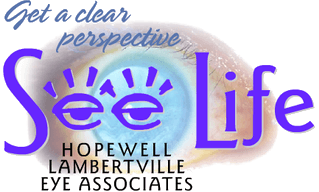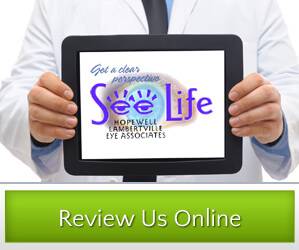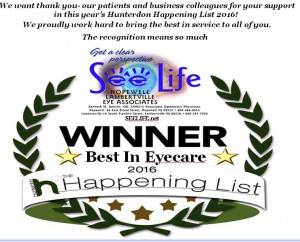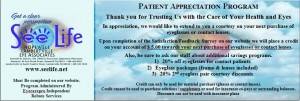Are Contact Lenses Right for You?
Contact lenses are available for virtually every prescription and lifestyle. Being able to see well, for most, is essential to performing the activities of day to day life. Good vision contributes to overall well-being and independence for people of all ages. For those with imperfect but correctable vision, many options can help to improve sight. These options most commonly include glasses, contact lenses, or laser surgery. Deciding which option is best for you depends on your eyes, lifestyle, and budget—and should be discussed with Hopewell Lambertville Eye
How do I decide if contacts are right for me?
If you are thinking about getting contact lenses, there are two things you need to do first.
- Learn the facts about contact lenses
- Visit your eye doctor
Contact lenses are an alternative to glasses. Invented more than 100 years ago, they were first made from glass and later hard plastic.
Today, contact lenses are made from soft plastic. They are small, thin discs designed so that you can place them directly on the surface (cornea) of the eye. Most often, eye doctors, or other licensed eye care professionals, prescribe contact lenses for vision problems such as nearsightedness, farsightedness and uneven focus (astigmatism). Eye doctors may also prescribe them to treat certain eye conditions and diseases. For example, people who have had cataract surgery, and who did not receive lens implants, may use special contact lenses.
Why do I need to see an eye doctor if I want contacts?
If you want to wear contact lenses, you must first schedule a visit with an eye doctor at Hopewell Lambertville Eye . Because contact lenses are medical devices, they need to be properly fitted by an eye care professional. This is true even if you don’t wear glasses and just want to wear contacts to change your eye color.
Once the eye doctor checks your eyes to make sure it’s okay for you to wear contacts, then he or she can write you a prescription for contact lenses.
Can anyone wear contact lenses?
Not everyone who needs glasses wants to wear contacts, but nine out of 10 people who want to wear them can wear contacts. However, contact lenses may not be a good option for people who:
- Have had repeated eye infections
- Suffer from severe allergic reactions
- Have problems with eye lubrication
- Are exposed to large amounts of dust, dirt or smoke have a specific vision problem or need special lenses
What are the different kinds of contact lenses?
Types of contact lenses
Contact lens manufacturers make lenses to meet virtually every need. When choosing contact lenses, you may hear these terms:
There are several types of contact lenses. The most common are soft and hard (rigid gas permeable). Gas-permeable lenses allow more oxygen to reach the surface (cornea) of the eye.
Contact lens Terminology:
Spherical lenses
Most people wear spherical lenses. These standard lenses correct farsightedness or nearsightedness.
Toric lenses
Toric lenses are weighted, so they rotate to match your specific eye shape. Optometrists often prescribe them for people with astigmatism (when the eye’s surface or shape isn’t perfectly round).
Multifocal lenses
Multifocal (sometimes called bifocal) lenses allow you to see both far away and close up. Glasses accomplish this by using the top of the lens for distance and the bottom for close up. But contact lenses use concentric rings — one for distance, one for close up — alternated throughout the lens. Multifocal lenses now come in a toric option as well.
Lens Options: All options are available at Hopewell Lambertville Eye
Soft contact lenses come in two basic forms—daily wear and extended wear. Both lenses are made from thin, flexible, material and water. Daily-wear lenses must be removed, cleaned and stored every day. Extended-wear lenses are designed for overnight wear. However, there is an increased risk of infection associated with extended-wear lenses. They should be worn for the period of time prescribed by your eye doctor.
Hard contact lenses offer clearer vision with certain eye conditions, and specific types may last longer. Many types of hard contact lenses are available in bifocals. It may take longer to adapt to wearing hard contact lenses than soft contact lenses. Hard contact lenses may slid out of place more easily when you engage in vigorous physical activity or sports.
Daily-wear soft lenses are the most comfortable, and your eyes will adjust to wearing them in less time than with hard contact lenses. Soft lenses may be worn during vigorous physical activities and playing sports with less likelihood that the lenses will slip out of place. They are available in a variety of tinted colors. Some people may not have clear vision wearing soft contact lenses due to certain eye conditions such as severe astigmatism. Soft contact lenses need special cleaning and disinfection and tear easily, so they may not last as long as hard contact lenses. Disposable soft contact lenses are replaced every day to every few months, depending on the type of lens.
Extended-wear soft lenses offer the same advantages as daily-wear lenses. These lenses may be worn for an extended period, up to a week. However, due to the risk of infection associated with extended use, daily removal and cleaning is recommended.
Monovision lenses
Another strategy for meeting both distance and close up needs is monovision lenses. Your eye doctor may recommend a scenario where you put a distance lens in one eye and a near vision lens in the other eye. The brain makes the necessary adjustments so you can see fairly well at all distances.
Hybrid lenses
Hybrid lenses offer the comfort of a soft lens with the vision of a hard lens. The part that touches the eye is soft, while the part over the cornea is hard. Hybrid lenses aren’t widely used but can be a good option for people with a particular prescription or astigmatism.
Scleral lenses
Scleral lenses are sometimes medically necessary if you had eye surgery or have an eye condition such as keratoconus. This is a unique type of lens used only for certain eye conditions such as irregular corneal shape, corneal ectasia, degenerations, keratoconus, ocular surface disease , dry eye,...... “It’s larger than the typical lens and is a rigid lens that vaults over the entire cornea onto the white of the eye.”
Orthokeratology lenses
An orthokeratology lens is approved for nighttime sleeping. The lens is used to fully correct a myopic concern by flattening the front surface of the cornea while wearing lenses during your sleeping hours and removing during the day. In essence this is similar to orthodontia for the teeth . The lens acts as a retainer — while you sleep, the lens gradually reshapes or molds the surface of the eye. When you wake up, your vision is clear. Throughout the day, the eye slowly returns to its normal shape.
What are the risks of wearing contacts?
Any time a foreign object or material is placed in the eye, there is an increased risk of problems. That’s why it’s important to follow your eye doctor’s instructions about care and cleaning of your lenses, and see your eye doctor for regular follow-up exams.
If you experience any of the following problems, contact your eye doctor:
- Unexplained eye discomfort or pain
- Redness of the eye
- Watering eyes
- Vision change
How do I care for my contact lenses?
Care and cleaning of contact lenses depends on the type of lens. All lenses need regular, thorough cleaning and storing. Daily-wear and extended-wear users must be especially careful to follow the recommended regimen of lens cleaning, rinsing, disinfecting, enzymatic cleaning and lens case cleaning.
For all lenses, always buy commercially prepared sterile solutions. Never use home-made saline solutions! They are dangerous. Your eye doctor can provide information and instructions for proper care of your contact lenses.
A Warning About Cosmetic Contact Lenses
Cosmetic contact lenses, often called zero-power or plano contact lenses, can make quite a fashion statement. But when these lenses are bought without a prescription at boutiques, beach shops, tattoo parlors and other nonprofessional retailers, they pose serious health risks.
People, teenagers in particular, have nearly lost their sight as the result of using nonprescription lenses.
Always visit an eye doctor to be fitted for contact lenses. Always wear contact lenses under the supervision of an eye doctor.
In New Jersey and many other states it is a criminal violation to accept a contact lenses from a non licensed individual.
"No person shall dispense contact lenses in this State unless he is a licensed ophthalmic dispenser or person licensed to practice medicine or optometry in this State. For the purposes of this act, "contact lenses" shall include contact lenses without power, sometimes referred to as "plano" lenses." Any person who dispenses contact lenses in violation of the provisions of this section is guilty of a crime in the fourth degree."
https://law.justia.com/codes/new-jersey/2013/title-2c/section-2c-40-25/
Contact lenses Safety
When cared for properly, contact lenses can provide a comfortable and convenient way to work, play, and live for the 45 million people in the U.S. who wear them. While contact lenses are usually a safe and effective form of vision correction, they are not entirely risk-free—especially if they are not cared for properly. Contact lenses are medical devices, and failure to wear, clean, and store them as directed can increase the risk of eye infections, such as microbial keratitis. To reap the benefits of wearing contact lenses, it is essential to practice healthy habits. Remember: Healthy Habits = Healthy Eyes.
https://www.cdc.gov/contactlenses/protect-your-eyes.html
In summary, contact lenses can be a better visual correction option leading to safe and optimized vision throughout the day while avoiding the inconvenience of eyeglasses. At Hopewell Lambertville Eye we offer all contact lenses options. In fact Dr. Daniels, has not only is a Adjunct Associate Professor at the Pennsylvania College of Optometry teaching Specialty Contact Lens but also has lectured nationally and internationally and has written a book, several book chapters and many journal articles on the subject.
Please call (Hopewell 609-466-0055) Lambertville (609-397-7020) or go to our website to make an appointment Hopewell Lambertville Eye to discuss your options.
References
Prevent Blindness.org ; https://preventblindness.org/wearing-contact-lenses/
https://www.cdc.gov/contactlenses/benefits.html




